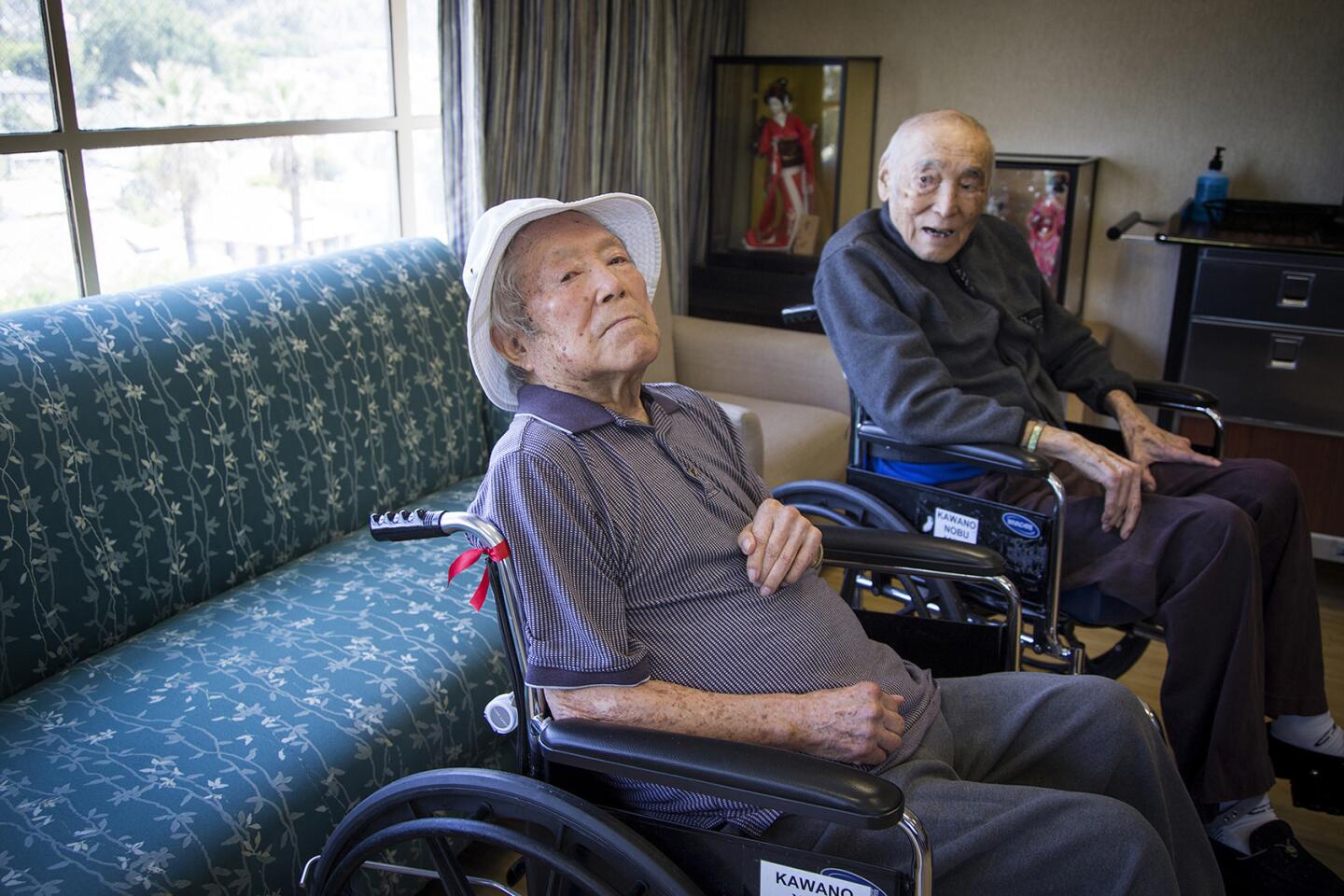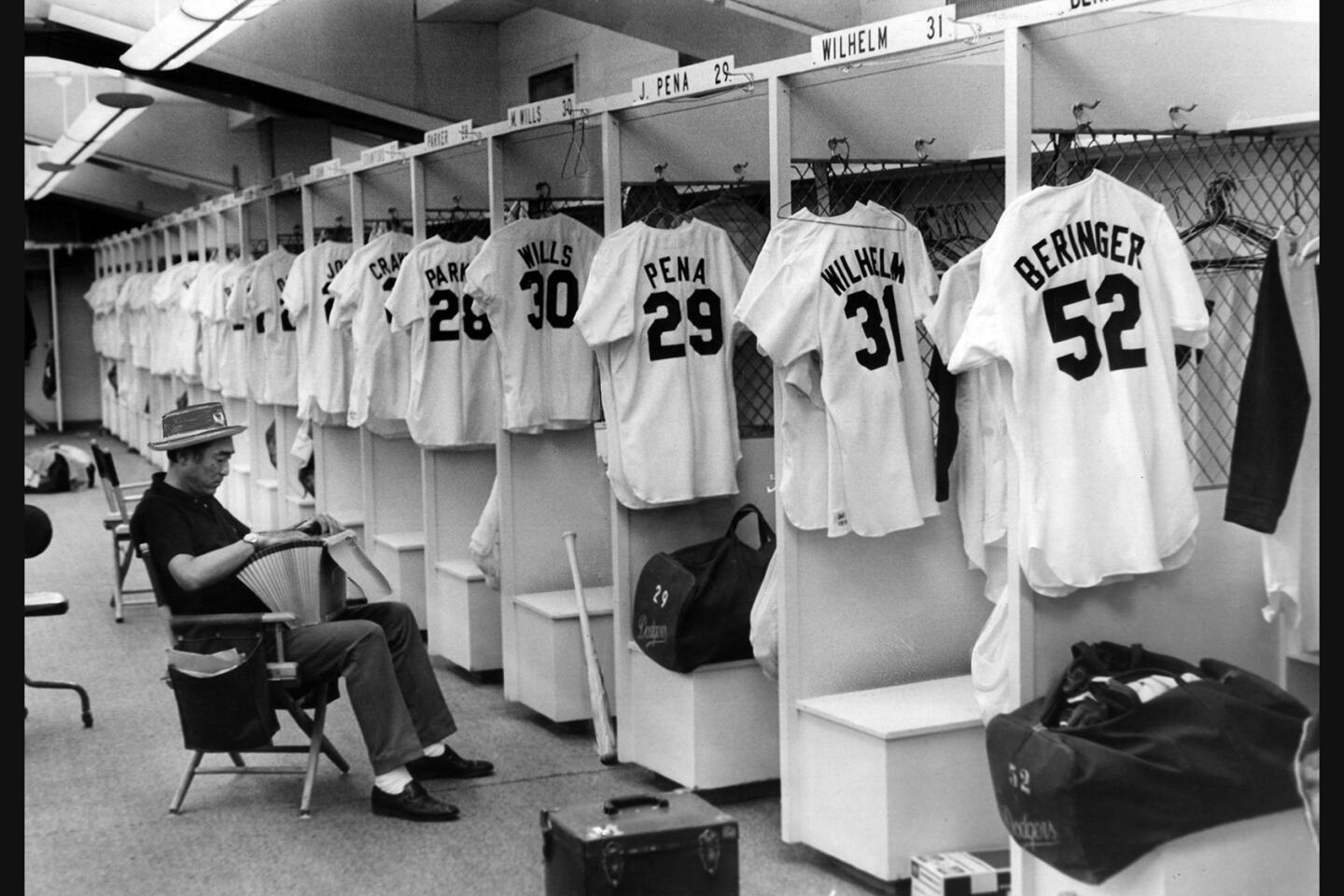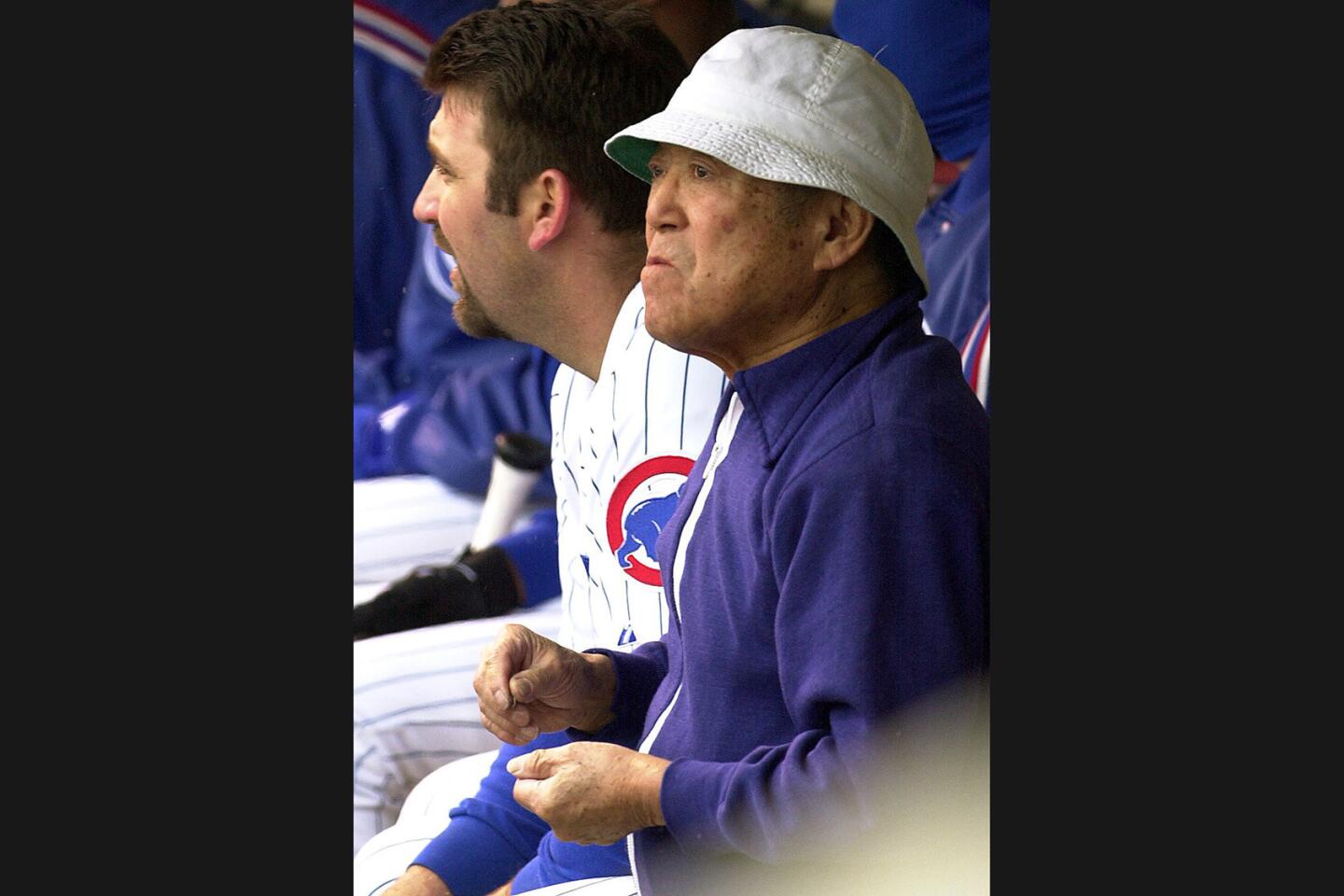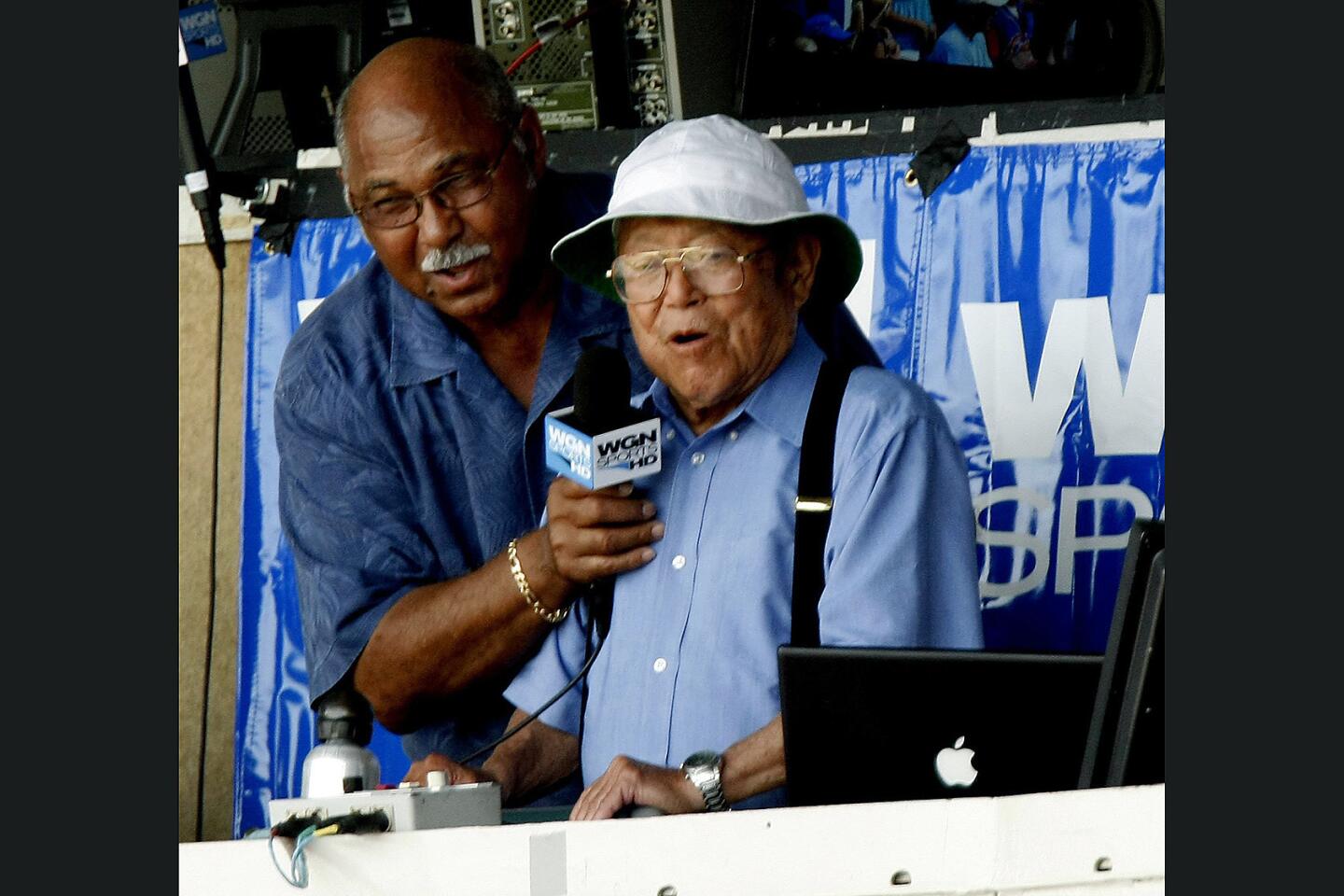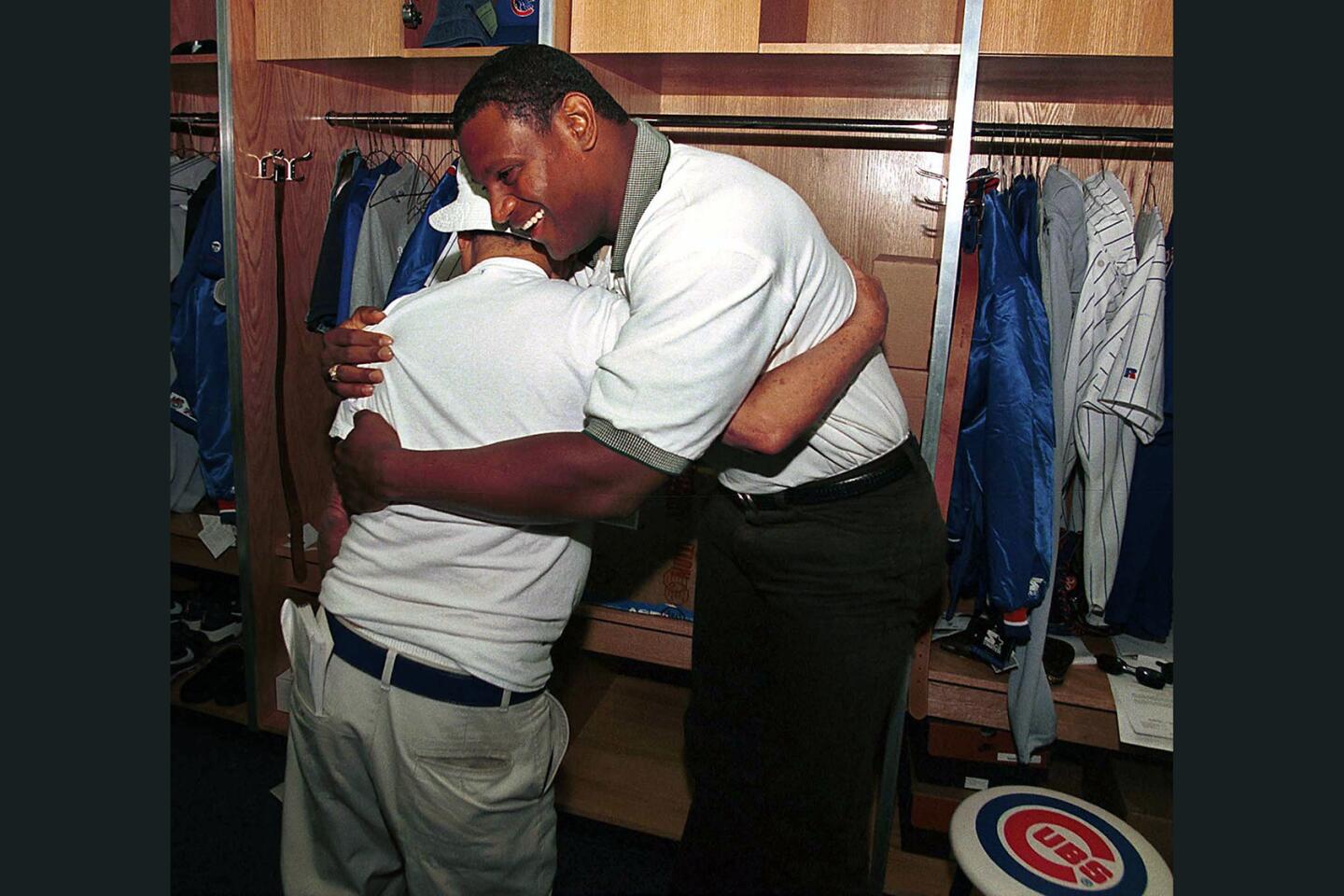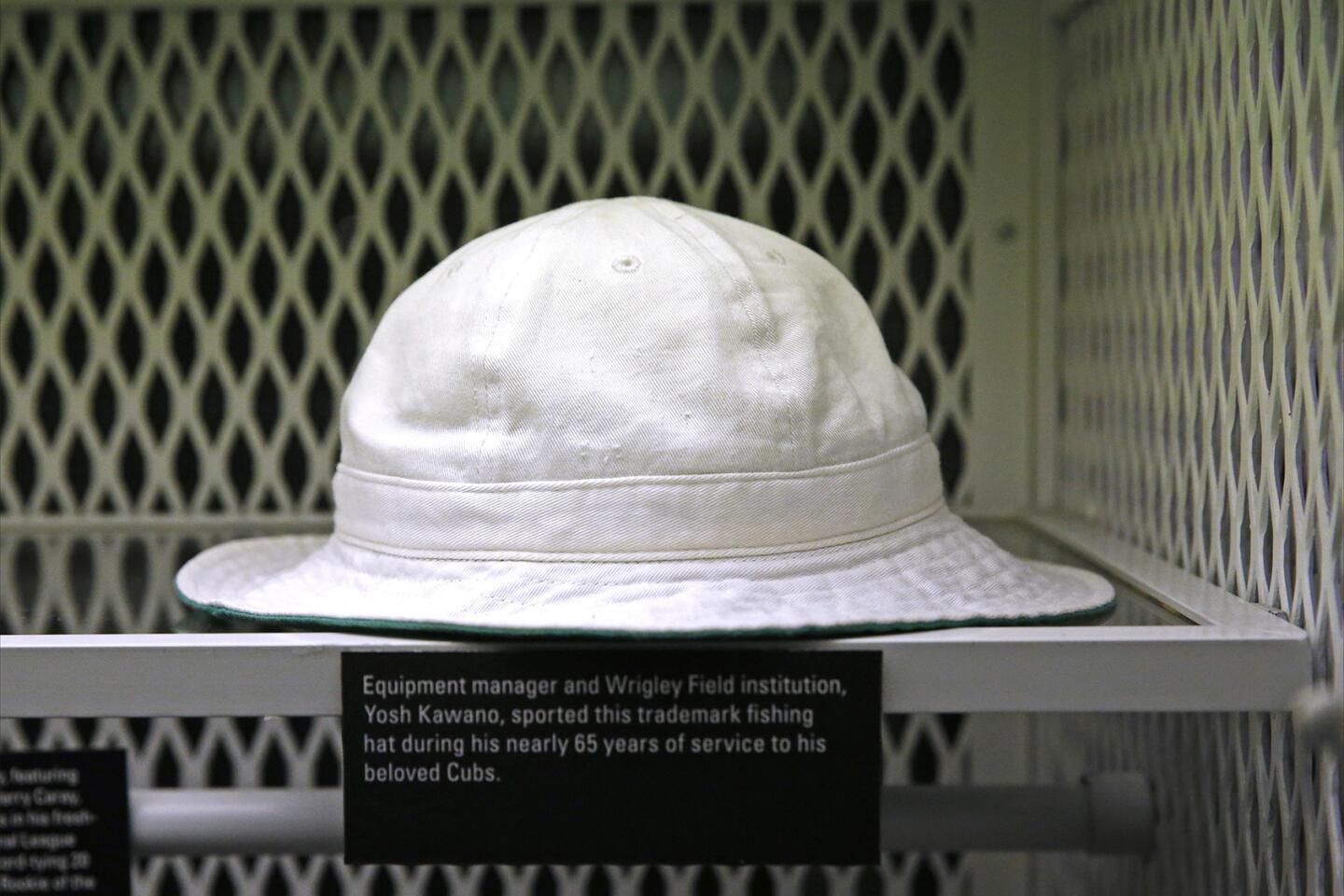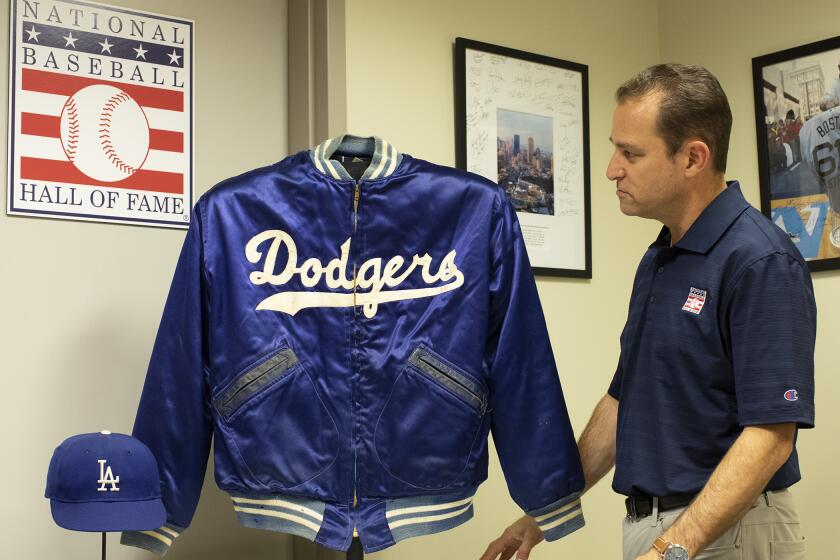From internment camp to Dodgers and Cubs clubhouses, these brothers became part of baseball history
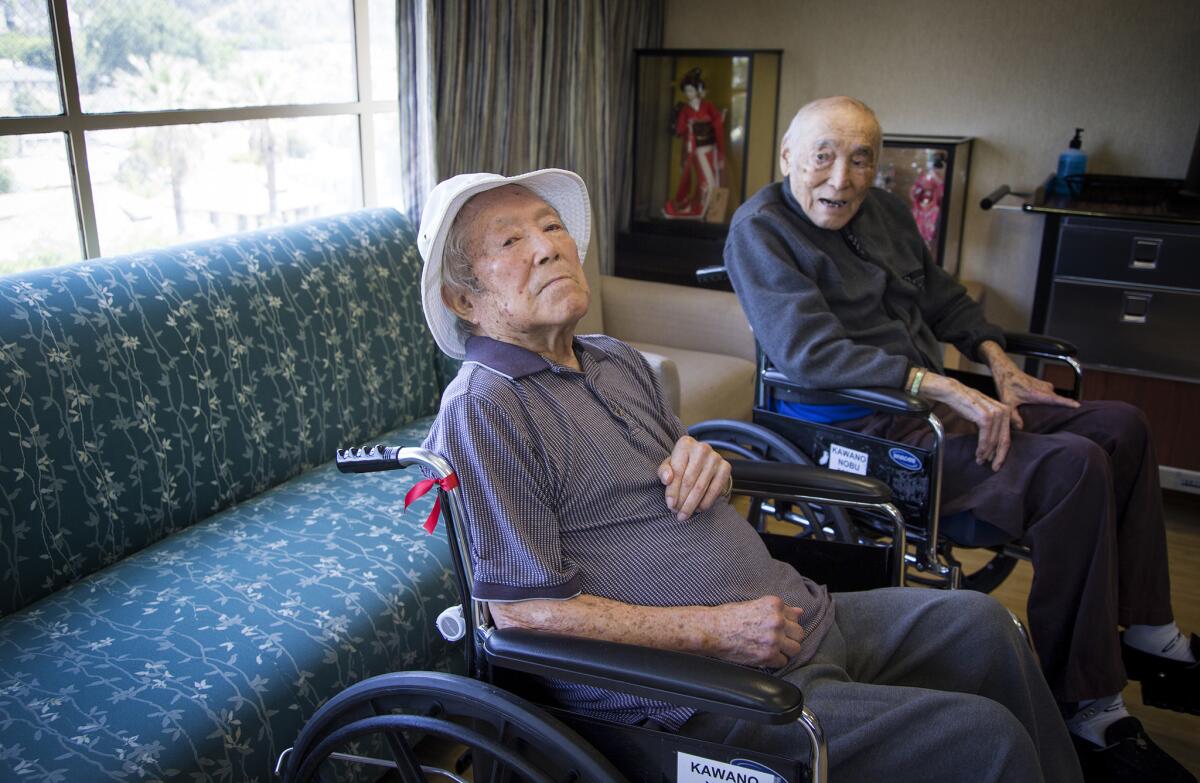
The Kawano brothers -- Yosh, 94, left, and Nobe, 93 -- were longtime clubhouse managers for the Cubs and Dodgers, respectively, and now live in the same retirement home in Los Angeles.
- Share via
The Kawano brothers seem to be listening. They occasionally smile or nod their heads but do not speak, so it is hard to guess what they are thinking.
On a bright Saturday morning, Yosh and Nobe sit near the window in a day room at their nursing home, the sunlight etching fine shadows across their wrinkled faces. Family has gathered around to tell stories from the old days.
Like the one about Sandy Koufax and the trash can. Or the boat out to Catalina Island, where the Chicago Cubs used to hold spring training before the war.
“Baseball was everything to them,” says Frank Kawano, who is Nobe’s son. “They loved the game.”
The brothers were never professional ballplayers. Yosh spent five decades in the major leagues as clubhouse manager for the Cubs, and Nobe held the same job for almost as long with the Dodgers.
Baseball was everything to them. They loved the game.
— Frank Kawano, Nobeâs son
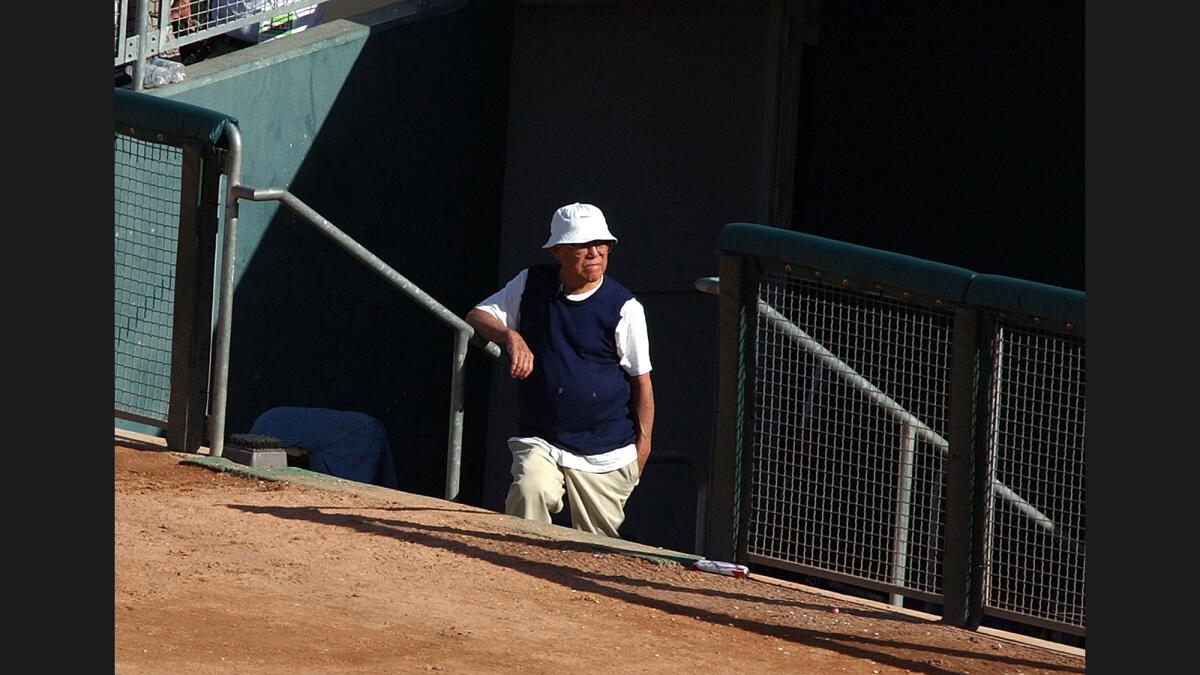
Yosh Kawano in the dugout in 2002. He retired from the Cubs in 2008, when he was 87.
Season after season, they ordered gloves and shoes for the players and laid out food before games. They kept uniforms clean. There was always mail to sort, floors to sweep and bags to pack for the next road trip.
None of this shows up in box scores or the official record book. Now that the brothers are well past 90, their lives in baseball endure mainly as anecdotes and snippets of memories.
Because dementia has largely robbed them of the ability to communicate, the tales must be kept alive by friends and relatives, by the players and managers for whom they worked.
“It’s pretty amazing, when you think about it,” says Ryne Sandberg, the former Cubs second baseman and Hall of Famer. “All the time they spent around the clubhouse, they probably saw everything.”
::
No one recalls exactly when Yosh started wearing the floppy white tennis hat that became his trademark in Chicago, along with the white T-shirt, khaki slacks and the wad of envelopes in his back pocket.
The way it worked with the Cubs — particularly in the early days — the clubhouse manager paid for the food he put out and had to collect from the players. He could make extra cash by selling them gloves, cleats and socks.
“They’d all have three pairs of stockings they would buy from me,” Yosh said in a 2008 interview recorded by Tony Ruzicka and his brother Carl, who wanted to preserve their friend’s memories. “Fifteen cents apiece.”
Each player’s tab was written in pencil, calculated to the penny and kept in a separate envelope.
“A guy would get traded away but Yosh would still keep that bill,” Sandberg says. “He’d catch up with the player, sometimes years down the road, and say, ‘Oh, by the way, you still owe $16.70.’”
There were flashes of playfulness when Yosh joined the team for games of pepper on the field. He once pitched batting practice to Rogers Hornsby after the legendary infielder had played for and managed the Cubs.
His clubhouse always had one empty locker with the name tag “Floyd.” An avid golfer, Yosh had struck up a lasting friendship with PGA Tour veteran and baseball fan Raymond Floyd.
But most people knew the solemn Yosh, the one who never married or had children, devoting himself to the job. He scurried among unpacked boxes and jotted notes on a long list of chores, scolding players who got in the way.
“Some of those kids were scared of me,” he said.
The clubhouse at Wrigley Field was small and cramped, difficult to keep in order, so outsiders were not entirely welcome.
Yosh watched to be sure no visitors picked at the players’ food. Before games, he kept an eye on the clock, waiting for the moment when reporters had to leave. Taking a broom in hand, he would begin sweeping, forcing everyone out the door.
One time, he followed a young sportswriter outside as the Cubs took batting practice. A grounder bounced their way and the reporter scooped it up, tossing it to a boy in the stands.
“Yosh starts chewing him out,” says Ned Colletti, a Dodgers senior advisor who formerly worked in Chicago’s front office. “He was telling the guy, ‘That’s not your baseball. That’s my baseball.’”
The reporter handed over $5. Yosh crumpled the bill and flipped it into the stands, saying: “Now we’re even.”
::
The word is dedicated. Both of them took their jobs very seriously.
— Rick Monday
In the 1930s, the clubhouse might have been the only place to forge a baseball career for the two Japanese American brothers who were born in Seattle, moved to Southern California at a young age and played the game voraciously.
Family and acquaintances recall that a teenage Yosh was caught stowing away on that boat to Catalina. Also on board was a Cubs executive headed for the team’s training camp.
The executive suggested putting Yosh to work shining shoes for ballplayers as penance, his family says. The kid must have liked it, because in the following years he wangled jobs with the Hollywood Stars of the Pacific Coast League and the Chicago White Sox, who held spring training in Pasadena.
When the U.S. entered World War II, authorities sent the Kawano family to an internment camp in Arizona, but word filtered back to the Cubs, who negotiated to bring Yosh to Chicago as a clubhouse assistant.
The team kept him on its payroll until Japanese Americans were allowed to enlist in the military and Yosh went off to serve in the Pacific. Nobe — whose given name is Nobu — was classified as 4F and joined the U.S. Merchant Marine.
After the war, Yosh returned to the Cubs and Nobe got hired by the Stars. The brothers approached their work in much the same way, quiet and meticulous, arriving at the ballpark hours before the first pitch and staying late into the night.
“The word is dedicated,” says Rick Monday, who came to know them while playing for the Dodgers and Cubs. “Both of them took their jobs very seriously.”
The Cubs promoted Yosh in 1953 — the team has variously described him as clubhouse or equipment manager. Nobe spent 11 years with the Stars, then switched to the minor league Salt Lake City Bees for one season before taking over the Dodgers clubhouse in 1959.
Diligence was only part of the job as the brothers learned to deal with quirky personalities and big egos that expected pampering. Frank says: “Some of the players would give my dad a hard time.”
Still, Nobe was protective of the team. On those occasions when he brought his assistants home for dinner, his daughter would hear muffled voices and peals of laughter coming from the living room.
“When I walked in,” Ruth Brown says, “it turned dead silent.”
::
Maybe the best-known stories about Nobe involve Koufax, a trash can and a bagel.
In 1960, Koufax suffered through an uncharacteristic 8-13 season. Frustrated, the future Hall of Famer tossed his gear into the garbage, vowing to return to college to study architecture.
The next spring, after his temper had cooled, he reported to camp at Vero Beach, Fla., and found all his things stacked neatly in his locker. Nobe had picked them out of the trash.
“I thought you might need this,” the clubhouse manager said.
Another time, Nobe put out bagels for the Jewish pitcher and heard about it from another player who yelled: “These doughnuts are stale.”
Baseball was simpler then; it was not yet a multibillion dollar business. When Nobe bought a new refrigerator and freezer for his family — a wife and three children — he took the old ones to Dodger Stadium. Same with the couch.
“He didn’t really spend a lot of time at home,” Frank says. “If the Dodgers were in L.A., he would come home late at night and get up early and start the day over again. When they were on the road, he would be with them.”
Still, Nobe had it easier than his brother, because the Dodgers clubhouse was larger and there were more assistants to help. In Vero Beach, the Dodgertown training camp had a golf course, so Nobe could sneak away to play with Monday and others on the team.
“Nobe was a little more forward than his brother,” former Dodgers manager Tommy Lasorda says. “He was funny at times.”
Everyone knew Lasorda was sensitive about his weight, so one time Nobe and first baseman Steve Garvey collaborated to change the name on the back of the manager’s uniform to “Lasagna.” Lasorda discovered the switch only after he got dressed and heard laughter flittering through the clubhouse.
A few seasons later, pitcher Jerry Reuss grabbed several of Lasorda’s uniform tops out of the dirty laundry and had them tailored a half-inch tighter.
Lasorda complained to Nobe. “What are you doing when you wash these shirts?” he recalled hollering. “You must be shrinking them because they are tight.”
This time, Nobe wasn’t involved but he ran such a tight ship, the rest of the team assumed he knew.
“Whenever Tommy’s uniform didn’t fit,” Reuss says, “he blamed Nobe.”
::
The Cubs made a big deal of Yosh’s retirement in 2008, holding a ceremony for the 87-year-old at Wrigley, having him throw out the first pitch.
By then, the clubhouse had already been named in his honor and the baseball Hall of Fame had requested one of those floppy hats to display in Cooperstown.
“He became an icon,” Sandberg says. “I don’t know how many clubbies can say that.”
Nobe’s career ended quietly after the 1991 season, when he retired at 68. He settled into a top-floor apartment in a building he constructed just outside the entrance to the Dodger Stadium parking lot.
Though he did not get a splashy send-off, his value to the team was evident. Monday recalls a moment from several years earlier, when the Dodgers were in Pittsburgh on a road trip.
The players boarded a bus to return to their hotel. Nobe almost never rode with them — he either stayed late to finish his chores or found another way back.
“We’re crossing the bridge to go downtown and, at a red light, we pull right behind a city bus,” Monday says. “I look up and Nobe Kawano is on that bus. He took a city bus.”
At the next stop, the outfielder jumped out to retrieve the clubhouse manager, saying: “You’re a Dodger. You travel with us.”
“When he got on, all the guys started clapping,” Monday says. “It was a real ovation and he started to giggle.”
So many years later, the sunlight glistens in Nobe’s eyes as the 93-year-old sits beside his 94-year-old brother, both of them in wheelchairs.
They have ended up in the same nursing home in Lincoln Heights, a short drive from that apartment where Nobe’s wife still lives with their son. Family makes a point to visit regularly.
On a weekend morning, relatives do all the talking, reminiscing about an era when bat boys had to empty clubhouse spittoons and the refrigerator was stocked with Eskimo Pies.
It is hard to know if the brothers understand. Every once in a while, Yosh nods his head. Nobe smiles.
Twitter: @LATimesWharton
More to Read
Are you a true-blue fan?
Get our Dodgers Dugout newsletter for insights, news and much more.
You may occasionally receive promotional content from the Los Angeles Times.
